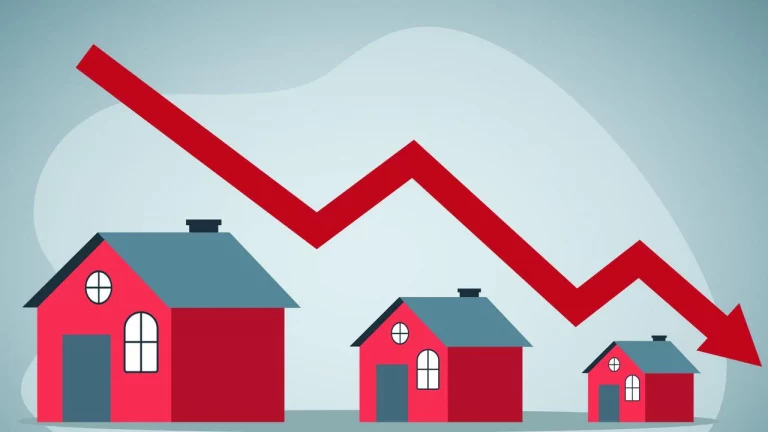Blog
Federal Reserve Interest Rate Cuts May Benefit Prospective Homebuyers
Federal Reserve Interest Rate Cuts May Benefit Prospective Homebuyers
The Federal Reserve’s interest rate decisions are among the most crucial factors shaping the U.S. economy, and they directly influence the housing market. For prospective homebuyers, interest rate cuts can bring significant financial advantages. As we navigate through the changing economic landscape of 2024, understanding how Federal Reserve interest rate cuts may benefit those hoping to buy a home has never been more important.
In this comprehensive guide, we will explore the impact of Federal Reserve interest rate cuts on homebuyers, housing market trends, mortgage affordability, and how these cuts affect broader economic conditions. We’ll also address common questions about taking advantage of lower mortgage rates and offer expert advice for navigating the housing market during rate cuts.

Understanding Federal Reserve Interest Rate Cuts
What Are Federal Reserve Interest Rate Cuts?
Federal Reserve interest rate cuts refer to the decision by the Federal Reserve to lower the federal funds rate, which is the rate at which banks lend money to each other overnight. This rate serves as a benchmark for other interest rates in the economy, including those on mortgages, car loans, and credit cards. When the Federal Reserve cuts interest rates, it aims to stimulate economic growth by making borrowing cheaper, thereby encouraging spending and investment.
Lower interest rates can have a ripple effect throughout the economy, particularly in the housing market, where they can lower mortgage rates and increase housing affordability for prospective buyers.
Why Does the Federal Reserve Cut Interest Rates?
The Federal Reserve cuts interest rates in response to a range of economic conditions, most notably during periods of economic downturn or when inflation is under control. By reducing the cost of borrowing, the Federal Reserve encourages individuals and businesses to take out loans, which can lead to higher consumer spending, increased business investment, and ultimately, economic growth.
For homebuyers, the most significant benefit of these cuts is the potential for lower mortgage rates. When mortgage rates decrease, monthly payments become more affordable, making it easier for buyers to purchase homes or refinance their existing mortgages.

The Impact of Interest Rate Cuts on Homebuyers
Lower Mortgage Rates: A Key Benefit
One of the most direct ways that Federal Reserve interest rate cuts benefit homebuyers is by lowering mortgage rates. As the federal funds rate decreases, banks and mortgage lenders typically lower their rates for home loans. This translates into lower monthly mortgage payments, which can make homeownership more attainable for many.
For example, if the Federal Reserve cuts rates by 0.5%, homebuyers could see a noticeable reduction in the interest rates offered on 30-year fixed mortgages. A lower mortgage rate can result in thousands of dollars in savings over the life of a loan. This is particularly beneficial for first-time homebuyers who may be navigating the complexities of securing a loan for the first time.
Home Affordability and Purchasing Power
As mortgage rates decrease, home affordability increases. Lower rates mean that buyers can afford higher-priced homes without significantly increasing their monthly payments. This can be especially important in competitive housing markets where home prices are high, and buyers need every advantage they can get to afford their dream home.
For instance, a buyer who was previously only able to afford a $300,000 home may now be able to afford a $350,000 home due to lower interest rates. This increase in purchasing power can open up more options in terms of home size, location, and features, making the dream of homeownership more attainable for many.
Moreover, for those considering buying a home in 2024, the current interest rate environment offers a unique opportunity to lock in favorable terms before potential rate hikes occur.
Refinancing Opportunities During Rate Cuts
In addition to benefiting new homebuyers, Federal Reserve interest rate cuts also provide significant refinancing opportunities for existing homeowners. When interest rates drop, homeowners who previously secured mortgages at higher rates can refinance their loans to take advantage of lower rates, reducing their monthly payments and overall interest costs.
For example, if a homeowner locked in a 30-year mortgage at a 5% interest rate a few years ago, and the Federal Reserve cuts rates, they may be able to refinance at a 3.5% rate. Over the course of a 30-year mortgage, this reduction could lead to tens of thousands of dollars in savings.
However, refinancing isn’t always the best option for every homeowner. Factors such as closing costs, loan terms, and how long the homeowner plans to stay in the home should all be considered before deciding to refinance. Nonetheless, for many homeowners, refinancing during a period of interest rate cuts can be a financially sound decision.

Housing Market Trends and Predictions Amid Interest Rate Cuts
Current Housing Market Trends Influenced by Rate Cuts
Federal Reserve interest rate cuts have a significant influence on housing market trends. When rates are low, more people are incentivized to buy homes due to the reduced cost of borrowing. This increased demand can lead to higher home prices in some markets, particularly if housing inventory is limited.
In 2024, we’re seeing a strong housing market bolstered by low interest rates, even as economic uncertainties loom. Many buyers are taking advantage of the favorable rate environment to secure homes, and this trend is expected to continue as long as the Federal Reserve maintains a policy of lower interest rates.
At the same time, sellers are also benefiting from this environment, as increased demand for homes often leads to quicker sales and, in some cases, bidding wars among buyers. Real estate agents are reporting high levels of competition in many desirable areas, making it a challenging yet exciting time to be in the market.
Real Estate Market Forecast for 2024
As we move further into 2024, housing market experts predict that Federal Reserve policies will continue to play a pivotal role in shaping real estate trends. While rate cuts are currently providing a boost to the housing market, future rate decisions will depend on factors such as inflation, employment levels, and overall economic growth.
Some forecasts suggest that the Federal Reserve may eventually need to raise rates again to curb inflation, which could have a cooling effect on the housing market. However, as of now, buyers and homeowners can expect a favorable environment for securing lower mortgage rates.
For those planning to buy a home, experts recommend acting sooner rather than later to take advantage of the current interest rate climate, as future rate hikes could increase borrowing costs.
Economic Effects of Federal Reserve Interest Rate Decisions
Broader Economic Impact of Interest Rate Cuts
Federal Reserve interest rate cuts not only impact the housing market but also have broader economic implications. Lower interest rates make borrowing cheaper for businesses, which can lead to increased investment in capital, expansion, and hiring. Additionally, consumers may feel more confident about making major purchases, such as homes and cars, when borrowing costs are low.
However, there are also risks associated with prolonged periods of low interest rates. If rates are kept too low for too long, inflation may rise, eroding the purchasing power of consumers. This is why the Federal Reserve carefully monitors economic conditions before making rate decisions, balancing the need to stimulate the economy with the need to keep inflation under control.
Comparing Rate Hikes vs. Rate Cuts in the Housing Market
The housing market reacts differently to Federal Reserve rate hikes versus rate cuts. When the Federal Reserve raises rates, borrowing costs increase, which can slow down home sales and reduce home affordability. In contrast, rate cuts have the opposite effect, stimulating demand and encouraging more people to buy homes.
During periods of rate hikes, we often see a decline in mortgage applications as potential buyers wait for better borrowing conditions. Conversely, rate cuts tend to boost mortgage applications as buyers rush to take advantage of lower rates.
Historically, Federal Reserve decisions have had a profound impact on the housing market. For example, during the 2008 financial crisis, the Federal Reserve cut rates aggressively to stimulate the economy and prevent a housing market collapse. More recently, rate cuts in response to the COVID-19 pandemic helped revive the housing market by making home loans more affordable.

Practical Tips for Homebuyers During Federal Reserve Rate Cuts
How to Take Advantage of Lower Mortgage Rates
If you’re a prospective homebuyer, there are several strategies you can use to take advantage of lower mortgage rates during a Federal Reserve rate cut:
- Get Pre-Approved for a Mortgage: Pre-approval can give you a clear idea of how much you can afford and lock in a lower rate before rates potentially increase.
- Shop Around for the Best Rate: Don’t settle for the first mortgage offer you receive. Compare rates from multiple lenders to ensure you’re getting the best deal.
- Consider Refinancing: If you already own a home, now may be a great time to refinance your mortgage and lock in a lower rate.
- Consult with a Financial Advisor: A financial advisor can help you determine whether buying a home or refinancing makes sense for your personal financial situation.
Common Mistakes to Avoid
While lower mortgage rates can be enticing, there are several mistakes homebuyers should avoid during Federal Reserve rate cuts:
- Waiting Too Long to Act: Interest rates can change quickly, so if you find a favorable rate, it’s often better to act sooner rather than later.
- Overextending Your Budget: Just because you qualify for a higher loan amount doesn’t mean you should stretch your budget. Be sure to consider other costs, such as property taxes, insurance, and maintenance.
- Ignoring Loan Terms: While the interest rate is important, don’t overlook other terms of the loan, such as the length of the loan, fees, and penalties for early repayment.
Frequently Asked Questions (FAQs)
How do Federal Reserve interest rate cuts affect mortgage rates?
When the Federal Reserve cuts interest rates, mortgage rates often decrease as well, making home loans more affordable.
Are Federal Reserve rate cuts good for first-time homebuyers?
Yes, rate cuts can benefit first-time homebuyers by lowering mortgage rates, which can increase home affordability and reduce monthly payments.
Is now a good time to buy a home due to rate cuts?
If you are financially prepared, now could be an excellent time to buy a home due to the lower borrowing costs associated with Federal Reserve rate cuts.
Can I refinance my mortgage during a Federal Reserve rate cut?
Yes, many homeowners refinance their mortgages during rate cuts to take advantage of lower interest rates and reduce their monthly payments.
What should I consider before refinancing my mortgage?
Before refinancing, consider the closing costs, how long you plan to stay in the home, and the new loan terms to ensure it’s the right decision for your financial situation.
Conclusion
Federal Reserve interest rate cuts offer a unique opportunity for prospective homebuyers and homeowners alike. By lowering mortgage rates, these cuts can increase home affordability, boost purchasing power, and create favorable refinancing opportunities. For those navigating the housing market in 2024, understanding the impact of these rate cuts and taking proactive steps to secure favorable loan terms can lead to significant financial savings. As always, consult with professionals, stay informed about rate trends, and act strategically to make the most of this advantageous economic climate.
 Skip to content
Skip to content

